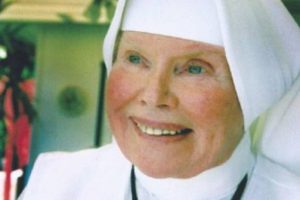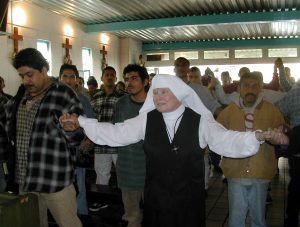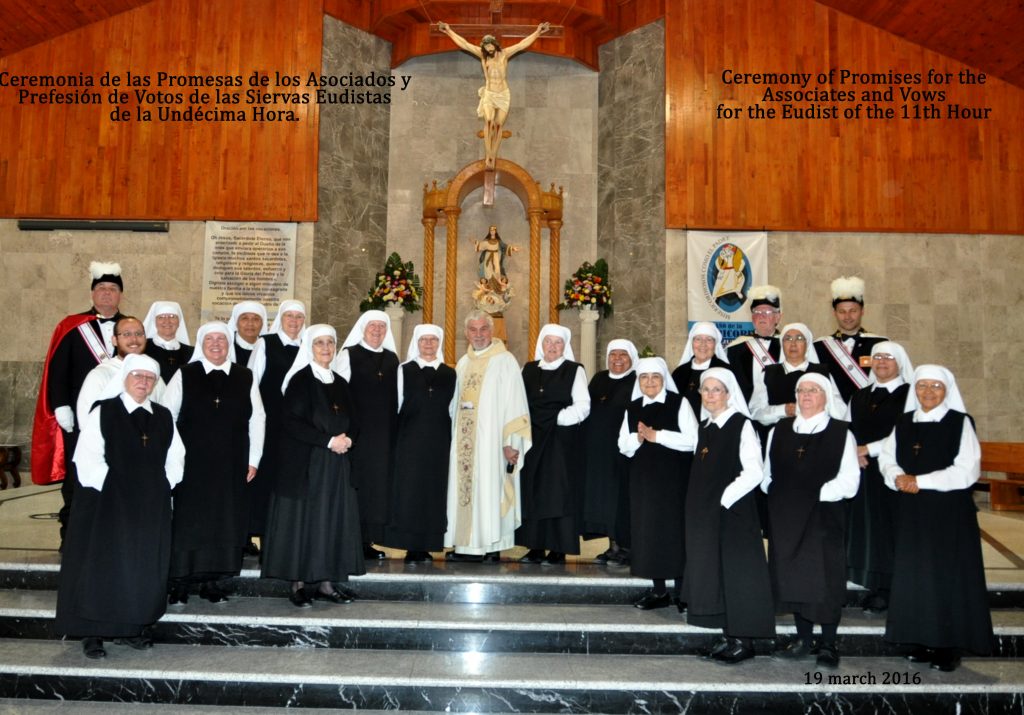6 And about the eleventh hour he went out and found others standing; and he said to them, ‘Why do you stand here idle all day?’ 7 They said to him, ‘Because no one has hired us.’ He said to them, ‘You go into the vineyard too.’ [Matthew 20:6-7, NRSV]
[L] Mother Antonia Brenner. [M] With prisoners at Sunday service. [L]The Eudist Servants that Mother Antonia Brenner founded.
She got married and divorced twice, gave birth to eight children with two different men, became a nun, and eventually founded a new religious order. She is known as Mother Antonia Brenner and remembered best as the “prison angel” of La Mesa Prison, Mexico. Clearly, divorce is not the end of life; nor is it a bar to sainthood either.
Mother Antonia died on October 17, 2013, aged 86. Born Mary Clarke into the family of Joe Clarke, a successful businessman, Mary and her two siblings grew up surrounded with affluence and the glitz of the movie world. A key element during her childhood, was that her dad had a deep love for all people and taught his children, with the good life that they had, to always be mindful of the less fortunate. That desire to help others would blossom in Mary and was destined to bear glorious fruits. In the mean time, however, her life would take some circuitous turns.
Mary married at 18 and had three children, the first dying shortly after birth. That first marriage ended in divorce, an event that led her to also distance herself from her Catholic upbringing. In her second marriage, she bore five children. Ultimately, that marriage also ended in divorce.
From then on, Mary became increasingly involved in charity work. In 1965 she met Father Henry Vetter who later took her along on a delivery of food, medicine and clothing to the prisoners at La Mesa Penitentiary in Tijuana. It was one of the worst prisons in Mexico, and the plight of the inmates there impacted her greatly. As time went by, her growing compassion and love of neighbor would become focused on these people who grew to become her passion, her specialty, her ministry, her purpose in life.
Over the next ten years, Mary Brenner made regular trips to La Mesa Prison, bringing needed supplies but mostly her love and mercy. Men and women prisoners looked forward to her visit, calling her “La Mama.” The warden, too, gave her accommodations so she could sleep over.
By and by, Mary took the name of Antonia and became Mother Antonia Brenner. She sewed together a nun’s habit and went to see Bishop Leo Maher of San Diego in it. On her knees she told her bishop her story. He knew all about her and gave her his blessing, validating her ministry. She then started a new order, Eudist Servants of the Eleventh Hour, an order for women aged 45 years and older who wanted to serve the less fortunate. This Order, amongst other things, drew inspiration from the Scripture: “And about the eleventh hour, he went out and found others…” (Matthew 20:6).
In addition to the blessing from Bishop Maher, she also received the blessing of Bishop Juan Jesus Posadas of Tijuana. Church authorities from two separate countries conferred authorization and blessing upon her ministry.
After her children were grown, Mary gave away her belongings, moved out of her home in Ventura and moved in to live permanently at La Mesa Prison on permission from the prison authority. All she had was no different from other inmates, a 10 feet by 10 feet concrete cell in the women’s section of the prison, cold water and prison food. Her possessions included a crucifix on the wall, a Bible, a Spanish dictionary and a hard prison bed. She lined up with the other prisoners for roll call in the morning, a life that lasted 32 years.
Nicknamed “The Prison Angel”, La Mama moved freely among hard core prisoners, amongst whom were drug traffickers, thieves, murderers, and rapists. Her ministry was as tactile – physically touching the cheeks of these violent and desperate men and women’s faces – as it was prayerful – offering prayers for them, and happily walking with them, comforting and consoling them, drying their tears and holding their heads between her hands as they were dying. She grew in stature and acceptance, enabling her to even single-handedly stopping prison riots and preventing disastrous escalation of violence. Hers is a great story of joy and hope in the midst of the harshness of life.
Mother Antonia Brenner loved the loveless, seeing the face of Christ in each and every prisoner she came in contact with and extended mercy and love to them all. These hardened criminals, some who had never loved or been loved, loved her in return and called the diminutive woman who hailed from Beverly Hills “Mama”.
What about her own family? She waited till her children were grown before abandoning herself to this ministry, and what a marvelous example she had set for her children.
Children learn more by example, and her story when told will benefit many other children as well who will learn from her sacrifices, faith and total abandonment.
Her daughter, Theresa, wrote:
- I am one of her children and I can assure you that my Mother was always there for us. Maybe not in a traditional way, but I always felt that she was a phone call away if I needed her. Her grandchildren and great grandchildren adored her and were proud of her. She had a tremendous capacity to love. She spread love, kindness and compassion to all who crossed her path. We feel blessed to have had her as a Mother.
Copyright © Dr. Jeffrey & Angie Goh, November 2018. All rights reserved.
You are most welcome to respond to this post. Email your comments to jeffangiegoh@gmail.com. You can also be dialogue partners in this Ephphatha Coffee-Corner Ministry by sending us questions for discussion.



